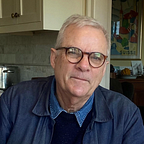Taking the Bus
“Took the bus,” my writing partner said, quoting his grandmother’s euphemism for “just died.” In a voicemail he left some days before, he noted the tests he was about to undergo, told me that nothing was life-threatening, then added, “It’s circling.”
In the fifth part of Eliot’s century-old poem, “The Waste Land,” the question is posed: “Who is the third who walks beside you?” Castaneda’s Don Juan Mateus describes him as a companion to whom we can turn to ask if this is the hour or the eye-blink, as the widow of my grandfather’s cousin put it.
In the first Duino elegy, Rilke writes,
Angels (they say) don’t know whether it is the living
they are among, or the dead. The eternal torrent
whirls all ages along in it, through both realms
forever, and their voices are drowned out in its thunderous roar.
He continues,
In the end, those who were carried off early no longer need us:
they are weaned from earth’s sorrows and joys, as gently as children
outgrow the soft breasts of their mothers. But we, who do need
such great mysteries, we for whom grief is so often
the source of our spirit’s growth — could we exist without them?
The first part is like Benjamin’s Angel of History,
A Klee painting named “Angelus Novus” shows an angel looking as though he is about to move away from something he is fixedly contemplating. His eyes are staring, his mouth is open, his wings are spread. This is how one pictures the angel of history. His face is turned toward the past. Where we perceive a chain of events, he sees one single catastrophe which keeps piling wreckage and hurls it in front of his feet. The angel would like to stay, awaken the dead, and make whole what has been smashed. But a storm is blowing in from Paradise; it has got caught in his wings with such a violence that the angel can no longer close them. The storm irresistibly propels him into the future to which his back is turned, while the pile of debris before him grows skyward. This storm is what we call progress.
The “great matter” the Buddhists note is not merely death itself or even its constancy as an inevitable ending and steady remover of others whose presence we took for granted. We can more readily accept the loss of others at some points in their lives than at others. The late queen dies officially “of old age” and we agree, but we decline to grant our actual human condition explanatory power in most other cases, wanting both a cause and a reckoning of some sort associated with it. We could as well say that someone died of youth or of middle age.
Rilke and Benjamin describe angels confronted with and overwhelmed by the sheer quantity of the living and dead, but my sense is that we each have an angel personal to us, aware of us. (Klee’s angel doesn’t look impersonal.)
Our arrival places us in life with its rhythms and momentum, its wildly varying situations, and its essential randomness. Our social conditioning makes us risk-adverse while minimizing our sense of danger sufficiently that we accept the risks our daily lives involve or require. We grasp (at times) that this is our human condition, shared universally. Despite our natural desire to shield others, we mostly understand that it’s unnatural to do so past certain points — that these others in their turn have to deal with life as it is, however perilous it proves for them. This is our “great matter.”
“Take the bus” captures the mystery of our leaving. Are we headed for Paradise, Hell, Oblivion, or another turn of the wheel? The angel — our angel — may have some sense of this. Yet it’s also utterly mundane. As the Buddha said of what awaits us, “Who knows? And this is not our concern.”
For me, this companion of ours is really an angel of our present, of the ground of our being — “present” in Benjamin’s sense of tied unpredictably to the past and the future, and also in the Buddhist sense of unfolding.
In her essay on Fleur Jaeggy, Meeka Walsh suggests also that our companion is the angel of our self-sufficiency, present when no one else is and able to bring us back to the everyday that, however precarious, is the gift handed us. Our companion, who may or may not be our own creation, personifies our place in the world and a sense of being seen and heard.
Notes:
The Rilke translation is by Stephen Mitchell, from Ahead of All Parting, Modern Library, 1995.
The Benjamin quote is from section IX of On the Concept of History.
Meeka Walsh, “Fleur Jaeggy’s Gift of Detachment,” Border Crossings, March 2018, collected in Walsh’s Malleable Forms, ARB Books, 2022.
